
NJ lawmakers want state, not towns, to OK needle exchange sites
TRENTON – State lawmakers are looking to address drug policies in the remaining weeks of their two-year legislative session, including a bill just one vote from reaching Gov. Phil Murphy’s desk that would decriminalize the possession of hypodermic needles.
A second bill that has advanced in both the Senate and Assembly though still has more hurdles to clear would expand harm reduction programs where sterile syringes are available to intravenous drug users by letting the state approve them, rather than municipalities.
Assemblywoman Valerie Vainieri Huttle, D-Bergen, said there’s a stigma attached to the programs, so towns resist hosting them even though they’re needed.
The state has seven harm reduction centers now – though the one in Atlantic City might be closed down, depending on the outcome of a court fight in which treatment advocates are battling city officials. There should really be one program in each county, Vainieri Huttle said.
“While all eyes have been focused on the COVID-19 pandemic for over a year and a half now, the epidemic of drug overdose has not waned. If anything, it has accelerated,” Vainieri Huttle said.
Assemblyman Erik Peterson, R-Hunterdon, said towns should decide whether to allow a harm reduction center in their borders and that such programs don’t compel someone to treat their addiction.
“It’s not facilitating their habit with clean needles, it’s when they hit rock bottom and everything seems to be at an end for them that those who are going to turn around turn around and get help,” Peterson said.
Jenna Mellor, executive director of the New Jersey Harm Reduction Coalition, said tougher love means tougher funerals. People who die after hitting rock bottom aren’t around to tell their stories about how they never got the helping hand they need, she said.
“Syringe access works. We know it works,” Mellor said. “We needed this in our state in the ‘80s and the ‘90s. We need it more than ever today.”
More than 2,400 people died of overdoses in New Jersey in the first nine months of the year, on pace to set another all-time high. Caitlin O’Neill of the New Jersey Harm Reduction Coalition says if lawmakers want to help, decriminalizing the possession of hypodermic needles is one way.
“No other chronic health condition is criminalized in the way that substance use disorder is,” said O’Neill, the group’s director of harm reduction services.
Seton Hall University law professor Jennifer Oliva, director of the school’s Center for Health & Pharmaceutical Law, said the state faces an important choice.
“Ignore the evidence, keep the current criminal law in place and risk exacerbating considerable public health harms,” Oliva said. “Or follow the science, enact this legislation that would decriminalize syringe possession and in so doing save lives and taxpayer dollars.”

Democrats on the committees advanced the bills, but Republicans were opposed. Assemblyman Bob Auth, R-Bergen, said people caught with syringes should instead be given a choice: Go to jail, or go to rehab.
“I don’t think we’re actually helping anybody by just saying, ‘Hey, no problem, just go about your business. We’re going to ignore it,’” Auth said. “We need to be really helping these people.”
Michael Symons is State House bureau chief for New Jersey 101.5. Contact him at michael.symons@townsquaremedia.com.
The 10 most-lobbied bills in Trenton in 2020 and 2021
CHECK OUT: Where NJ's biggest winning lottery tickets were sold
More From New Jersey 101.5 FM









